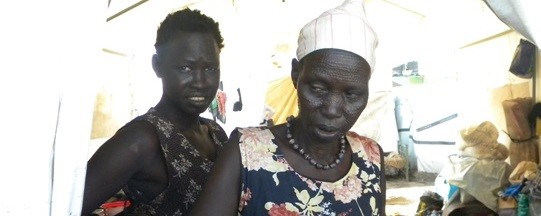Scramble to decongest Juba camps after first rains

The United Nations and aid agencies say they are rushing to decongest the overcrowded Tongping and UN House camps in Juba after a week of rains, the first of the impending rainy season in South Sudan. The peacekeeping mission is preparing new ground on which to settle the camp residents, most of whom have spent three months under UN protection.
Heavy rains have flooded camp residents’ shelters, collapsed tents, and created pools of stagnant water in and around homes. About a fifth of the homes in the Tongping camp were flooded or destroyed in the first rains on 7 March.
Facing the onset of the rainy season, NGOs and residents are worried about a deadly health situation inside the IDP camps in Juba, particularly Tongping camp where there is poor sanitation and cases of malnutrition. Watery diarrhea, measles and malaria, coupled with malnutrition, are reported to be the leading killer diseases in the camps.
Anyanyu Gatleak, a resident of the UN camp in Tongping, explained that their children are suffering due to the rains in Juba over the last week. He urged the NGOs to assist in relocating them elsewhere.
“You can see with your own eyes about our situation here in the camps particularly with this rain – we do not want to be here but the war has forced us to be here, and what we need is our children to be protected from this worrying situation,” Gatleak said.
Another refugee at the UN compound, Elizabeth Nyro (pictured above), says they are not ready to leave the UN compound in spite of the poor living conditions. “We are not leaving until the fighting stops,” she said.
UNMISS transferring residents
The UN Mission began an operation on 12 March to move residents from the Tongping site to the UN House site, which lies on somewhat higher ground on the other side of the city. In an interview, the mission spokesperson Ariane Quentier told Radio Tamazuj so far they moved 400 people who chose to leave the Tongping site.
“As you know the protection sites are absolutely congested,” she said, using the UN term for the camps. “There are far too many people in them and we’re getting closer and closer to the rainy season – we already had rains a couple of days ago, and this is simply untenable. We need to give people more space in a different area where the conditions are going to be better,” she said.
The spokesperson referred also to plans to extend the UN Jebel House site and find another area to settle the refugees. “With land that has been made available to us by the government we’re in the process of constructing new protection sites,” she said.
“We are going to protect them as long as needed and as long as they don’t feel safe elsewhere. Those people voted with their feet and they came to UN compound because they did not feel safe. And they felt the only place where they could be safe was in UNMISS compound,” she added.
She declined to give a specific date for the end of the relocation operation, saying, “It’s a long process, it’s a slow process, it’s ongoing. We’re doing it little by little. We have to convince people because we don’t want to force them so it’s very hard to tell how long it’s going to take.”
Asked about the security of the ‘Protection of Civilians’ sites, she declined to say from whom the civilians needed protecting. “No, I don’t think there’s any threat from the government at all. We’re not talking about that at all,” she said, pointing instead to criminality and tension within the sites as the reason for moving the residents to fortified compounds elsewhere.
Weak nutrition
Jérôme Oberreit, MSF Secretary General, said the situation of the displaced persons is ‘worrying’ owing to the combination of weak nutrition and the onset of the rains.
In an interview, the visiting director of MSF International explained that his organization has increased its presence in anticipation of deteriorating conditions. “MSF is present in most of the IDP sites that have been created since the start of the conflict in mid-December 2013,” he noted.
The humanitarian official urged all the NGOs and other major actors in South Sudan to mobilize the needed aid for the displaced people in the last weeks ahead of the rains.
Related coverage:
Key humanitarian updates: Rain in Juba (12 March)